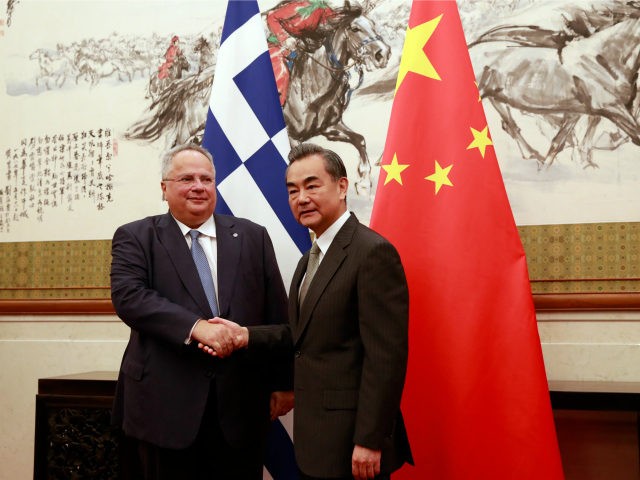Greek Foreign Minister Nikos Kotzias and Chinese Foreign Minister Wang Yi signed an agreement on Monday for further Greek cooperation with China’s “Belt and Road” infrastructure plan, the latest step in the debt-driven courtship between Athens and Beijing.
Of course, the ministers portrayed the signing as a milestone in Chinese and Greek cooperation against the dark forces of “unilateralism and protectionism,” as China’s state-run Xinhua news service reported:
“The signing is like installing a new high-powered engine for China-Greece relations, which will inject strong and long-lasting impetus into the pragmatic cooperation between the two countries,” said Hua, quoting Chinese State Councilor and Foreign Minister Wang Yi.
As an important meeting point of the land and maritime Silk Roads, Greece is a natural partner for China when it comes to the construction of the Belt and Road, Hua said, adding that the Port of Piraeus is a model of China-Greece cooperation.
Against the background of rising unilateralism and protectionism, the joint construction of the Belt and Road is an important symbol of multilateralism, according to Hua.
In addition, he continued, it is a useful exploration tool for the improvement of global governance, as well as the liberalization and facilitation of trade and investment.
The Chinese Foreign Ministry struck a similar tone in its announcement of the meeting, describing the memorandum of understanding it signed with Greece as a commitment to “strengthen the integration of development strategies to promote the construction of the Belt and Road Initiative” and “enhance coordination and cooperation in major international and regional affairs to jointly address global challenges.”
The Chinese also expressed optimism that Greece can help them develop better relations with the European Union.
China cited the Greek port of Piraeus as an example of successful cooperation. Piraeus is one of several European and Mediterranean ports where China has been aggressively buying up facilities to shore up the maritime shipping element of Belt and Road. Chinese state-owned firms now control almost ten percent of all European port capacity.
After Beijing sank a billion dollars into Piraeus, Greece became a stalwart ally of China against European Union attempts to condemn Chinese human rights violations and military aggression in the South China Sea.
The New York Times warned exactly one year ago that Greece’s shaky finances and simmering resentment against EU-imposed austerity measures would drive it into China’s orbit:
While Europe was busy squeezing Greece, the Chinese swooped in with bucket-loads of investments that have begun to pay off, not only economically but also by apparently giving China a political foothold in Greece, and by extension, in Europe.
Last summer, Greece helped stop the European Union from issuing a unified statement against Chinese aggression in the South China Sea. This June, Athens prevented the bloc from condemning China’s human rights record. Days later it opposed tougher screening of Chinese investments in Europe.
Greece’s diplomatic stance hardly went unnoticed by its European partners or by the United States, all of which had previously worried that the country’s economic vulnerability might make it a ripe target for Russia, always eager to divide the bloc.
Instead, it is the Chinese who have become an increasingly powerful foreign player in Greece after years of assiduous courtship and checkbook diplomacy.
Europe spent money to sustain Greece for years, writing off gigantic amounts of Greek debt and suffering periodic threats from Athens that it would essentially declare bankruptcy and destroy all of its creditors if the financial spigot was not kept open.
The Party of Prime Minister Alexis Tsipras sought to weaponize Greece’s debt and use it as political leverage against the very countries that kept his system afloat. The very stability of the European Union was put in doubt. Tsipras ran against austerity and then stunned friends and foes alike by accepting it and becoming a fiscal drill sergeant.
Greece emerged from its hated austerity regimen with a stripped-down government and tuned-up economy that actually works. It has positive economic growth and a budget surplus now.
“For the first time since early 2010 Greece can stand on its own feet. This was possible thanks to the extraordinary effort of the Greek people, the good cooperation with the current Greek government and the support of European partners through loans and debt relief,” applauded European Stability Mechanism chairman Mario Centeno on August 20, as Greece formally concluded its third and final bailout by the European Central Bank and International Monetary Fund.
And now, Europeans can do little but grind their teeth as China waltzes in with sacks of cash and sweeps Greece away across the dance floor, even though the payoff is a fraction of the $330 billion loaned to Athens since 2010. Beijing was able to buy political influence in Greece for pennies on the euro.
Greek officials told the New York Times last year that their new patrons in China do not have to ask for political support. As Greek parliamentarian Costas Douzinas put it, “If you’re down and someone slaps you and someone else gives you an alm, when you can do something in return, who will you help, the one who helped you or the one who slapped you?”
Incidentally, China has been playing a similar game with the other notoriously weak economies of Europe, such as Portugal and Spain. After billions of dollars of Chinese investment, Portugal preferred a Chinese takeover of its largest company to a European buyout.
After making lavish investments in Spanish ports, China told the University of Salamanca it ought to cancel its annual Taiwan Cultural Days event because it “causes confusion and misunderstandings about the Taiwan problem.” On Monday, the university did exactly that.

COMMENTS
Please let us know if you're having issues with commenting.